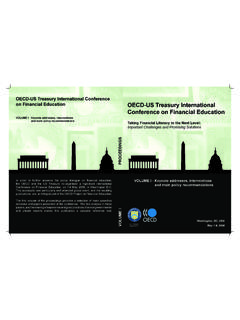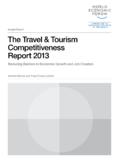Transcription of A joint report from the Center for Financial …
1 How Financial Institutions and Fintechs Are Partnering for Inclusion: Lessons from the Frontlines A joint report from the Center for Financial Inclusion at Accion and the Institute of International Finance JULY 2017. Sonja Kelly PART ONE OF THE. Dennis Ferenzy MAINSTREAMING Financial . INCLUSION SERIES. Allyse McGrath How Financial Institutions and Fintechs Are Partnering for Inclusion: Lessons from the Frontlines Sonja Kelly Dennis Ferenzy Allyse McGrath Foreword by Zia Zaman, Chief Innovation Officer, MetLife Asia and CEO, LumenLab Acknowledgements We thank all those who participated in our research and particularly the executives from 25 Financial institutions, fintech firms and other entities who generously shared their insights.
2 We gratefully acknowledge the following organizations: Allianz SE, AXA, Bancolombia, BBVA. Bancomer, CaixaBank (MicroBank), Citi, CVOX Group, DemystData, Diamond Trust Bank, Entrepreneurial Finance Lab, ICICI Bank, ING, International Finance Corporation, Mastercard, Mastercard Labs, MetLife (LumenLab), Mitsubishi UFJ Financial Group, Santander, Soci t . G n rale, Stanbic Bank Ghana, Sw7, Turkiye Is Bankasi, Ujjivan, and WeBank. Please see the full list of executives interviewed in the Appendix. We note with gratitude the insights and guidance of the Research Advisory Group for the project: Vikas Raj, Managing Director, Accion Venture Lab; Hugo N jera, Head, Business Development & Digital Banking, BBVA Bancomer ; Anju Patwardhan, Partner, CreditEase Fintech Fund.
3 Vitas Argimon, Vice President, International Private Clients Western Europe, Credit Suisse AG;. Momina Aijazuddin, Global Head, Microfinance, International Finance Corporation; Zia Zaman, Chief Innovation Officer, MetLife Asia; Monica Engel, Partner, Quona Capital; and Wendy Dobson, Head, Group Policy, Advocacy, and Sustainability, Standard Bank Group. Indeed, the strong support and thoughtful insights of these advisory group members have been essential to this project. We are grateful to Elisabeth Rhyne of the Center for Financial Inclusion at Accion (CFI) and Kristen Silverberg of the Institute of International Finance (IIF) for their over-all guidance and support. We are also grateful to Virginia Moore (CFI) for her editing and to Shailee Seddiq and Mounika Ramaji of IIF for their layout and graphic design work.
4 This report is part of a two-year initiative, Mainstreaming Financial Inclusion: Best Practices, that aims to help advance efforts of Financial institutions to reach customers at the base of the economic pyramid. It is the first of six reports in this series. The initiative and this report were made possible by generous Financial support from MetLife Foundation. CFI is also grateful for generous support from its founding partner, Credit Suisse. However, the views and opinions expressed in the report are those of the authors and do not reflect the views and opinions of the interviewees, the advisory group members, or MetLife Foundation. All errors are our own. 2. Foreword The Case for Inclusion Inclusion is not just about new products and new distribution.
5 It's about reimagining, with the help of partners, new ways to deliver micromoments of value for the two billion financially underserved people of the world. And the best way to unlock value for these customers is through partnerships. The Case for Interoperability in Fintech There has been a rapid rise in the number of fintechs willing to partner with incumbents like us, and more emphasis is now being placed on how to partner. From venture investing to corporate-startup engagement programs, the mandate has become: make the incumbent more interoperable. How a company chooses to interact with others, its environment, the ecosystem and all the other organizations around it will increasingly shape how well that company will adapt and thrive in a dynamic world.
6 Generally speaking, we as large organizations need to do a better job of interacting with the external world and developing allocentricity, the ability to think from someone's else's point of view, to maximize collective good. Systematically, large companies need to improve the process of finding partners, sensing and sourcing and how to operationalize partnerships. Over time, we recognized that we needed to shift employees' mindsets not only towards growth but also towards becoming more customer-led and open to innovation externally. Collab is our program to work with the fintech community on known challenges that we face within our business by enlisting internal champions to work directly with fintechs.
7 To get this ecosystem approach to work, you need more than just tech. Interoperability is about people. To get a startup's innovations to work within your organization and to add value to your business you need the tech to interoperate, of course. But you also, crucially, need people. Interoperability is becoming one of the most critical factors in determining the survivability of any large Financial services company. As Stephen O'Hearn of PwC said, The key question is therefore no longer whether to be involved with insurtech, but how to develop a model capable of combining your strengths with the speed and agility of this innovative ecosystem.. The mindset shift required to get employees engaged and capable of working with startups is a big one, and the transformation takes time.
8 Programs like Collab show that it can be done. My colleagues at other institutions are also undertaking similar shifts, seeking to leverage partnerships with fintechs for the sake of inclusion. I welcome this report by IIF and CFI, and applaud the efforts of both organizations in highlighting the important role Financial institution- fintech partnerships play in driving inclusion. Zia Zaman, Chief Innovation Officer, MetLife Asia and CEO, LumenLab How Financial Institutions and Fintechs Are Partnering for Inclusion: Lessons from the Frontlines 3. Contents The Road to Case Study 1: BBVA Bancomer and Identifying Prospective Organizing for Working Systems Pilot Testing.
9 17. Ongoing Partnership Favorable Contract Investment ..18. Future Benefits ..18. Future Partnerships that Meet Financial Inclusion Gaining Access to New Market Case Study 2: AXA and Case Study 3: Diamond Trust Bank and Kopo Kopo ..24. Case Study 4: Mastercard and Case Study 5: Soci t G n rale and Creating New Offerings for Existing Case Study 6: ICICI Bank and Case Study 7: Stanbic Bank and Case Study 8: Santander and Data Collection, Use, and Case Study 9: MicroBank and Entrepreneurial Finance Lab (EFL)..30. Case Study 10: DemystData and Major Philippines Bank ..31. Case Study 11: Ujjivan and Deepening Customer Engagement and Product Case Studies 12 and 13: Bancolombia and BBVA Bancomer and Case Study 14: MetLife and What's Next?
10 36. Appendix A: Study Appendix B: Persons How Financial Institutions and Fintechs Are Partnering for Inclusion: Lessons from the Frontlines 4. Introduction During our interview with Nina Nieuwoudt of Mastercard, we asked about the value of partnerships between mainstream Financial institutions and fintechs. Nina recalled a familiar African proverb: If you want to go fast, go on your own. If you want to go far, go together. Her attitude is shared by many of the Financial sector participants we interviewed. Banks, insurers, and payment companies don't see fintechs as little more than pinpricks for a banking mastodon with trillions in assets, as The Economist so colorfully described the fintech-bank relationship in 2015.







